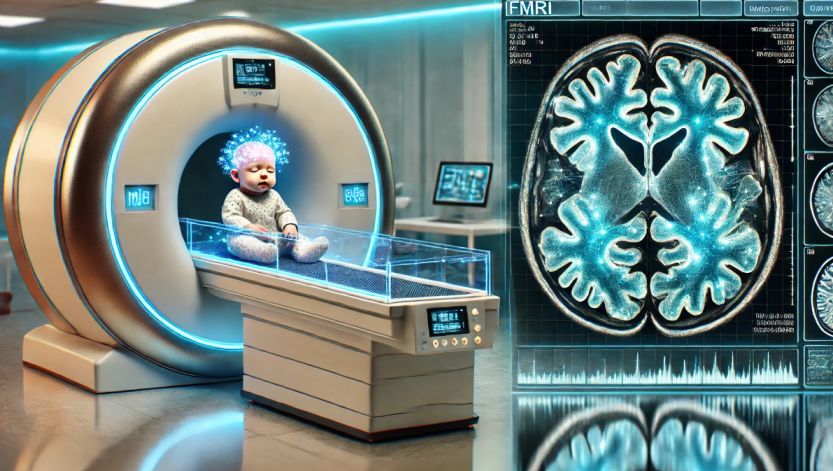Challenging long-held assumptions about infant memory, a groundbreaking functional magnetic resonance imaging (FMRI) study reveals that even at the tender age of 12 months, infants possess the ability to encode and retain memories. Published in Science, the research challenges the conventional notion of infantile amnesia—the widespread inability to recall early childhood experiences—by suggesting that the phenomenon stems more from retrieval deficits rather than an outright incapacity to form memories.
Despite infancy being a phase of accelerated cognitive development, most individuals struggle to retrieve recollections from their initial years. Conventionally, humans fail to recall episodic memories from the first three years of life, leaving a perplexing void in their autobiographical narrative. This enigma has long intrigued neuroscientists, with one prevailing hypothesis attributing it to the immaturity of the hippocampus—an integral brain structure responsible for consolidating episodic memories.
The findings of this study prompt a paradigm shift, implying that while infants do encode memories, the mechanism for retrieval remains inefficient in later years. This revelation opens new avenues in cognitive neuroscience, urging a deeper exploration of how memory retrieval evolves and why the recollections of early life remain largely inaccessible as we age.
Long-held assumptions
Beliefs or ideas that have been accepted as true for a long time, often without questioning or evidence.
- Context in the article:
The study challenges traditional beliefs about infant memory that people have assumed to be correct for years. Previously, scientists thought that infants couldn’t form memories at all, but new research suggests otherwise.
- Example Sentence:
Many long-held assumptions about the brain’s ability to regenerate neurons have been disproven by modern neuroscience.
Tender
Soft, delicate, or in the case of age, very young and vulnerable.
- Context in the article:
The phrase “tender age of 12 months” emphasizes that even at a very young and delicate stage of life, infants have the ability to encode and retain memories.
- Example Sentence:
At the tender age of six, she had already developed a deep love for reading.
Retrieval deficits
Difficulty in accessing or recalling stored memories.
- Context in the article: The research suggests that the inability to remember early childhood events is due to problems in retrieving them rather than an inability to form them.
- Example Sentence: The elderly often experience retrieval deficits, making it hard to recall past events quickly.
Outright Incapacity
A complete and absolute inability to do something.
- Context in the article:
The study suggests that infantile amnesia is not due to an outright incapacity (a total inability) to form memories but rather a problem with retrieving them later in life. This means infants can form memories, but they struggle to recall them as they grow.
- Example Sentence:
The company’s outright incapacity to manage its finances led to bankruptcy.
Perplexing Void
A confusing or mysterious gap, often in knowledge, understanding, or memory.
- Context in the article:
The term “perplexing void” refers to the unexplained gap in human memory—why people cannot recall events from their first few years of life despite experiencing rapid cognitive development during infancy.
- Example Sentence:
The detective faced a perplexing void in the investigation, as a crucial witness had disappeared without a trace.
Enigma
Something mysterious, puzzling, or difficult to understand.
- Context in the article: The inability to recall early childhood experiences has puzzled researchers for years.
- Example Sentence: The sudden disappearance of the scientist remains an enigma to this day.
Intrigued
Fascinated or deeply interested.
- Context in the article: Scientists are deeply interested in understanding why infant memory works the way it does.
- Example Sentence: The mysterious ancient script intrigued archaeologists for decades.
Paradigm Shift
A fundamental change in the way people think about or approach a particular concept, system, or belief.
- Context in the article:
The study’s findings challenge old beliefs about infant memory, leading to a paradigm shift—a transformation in how scientists understand memory formation and retrieval in infants. Instead of assuming infants cannot form memories, researchers now believe the issue lies in memory retrieval.
- Example Sentence:
The rise of artificial intelligence has caused a paradigm shift in how businesses approach automation and decision-making.
Revelation
A surprising or previously unknown fact that is suddenly discovered or made clear.
- Context in the article:
The study provides a revelation by showing that infants can form memories, contradicting the long-standing belief that they are incapable of doing so. This discovery opens new avenues for research in cognitive neuroscience.
- Example Sentence:
The scientist’s findings were a revelation, changing how we understand the effects of climate change.



